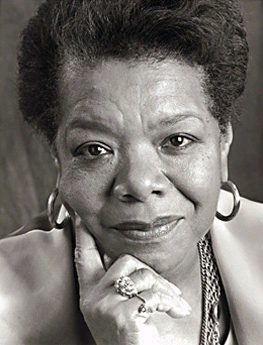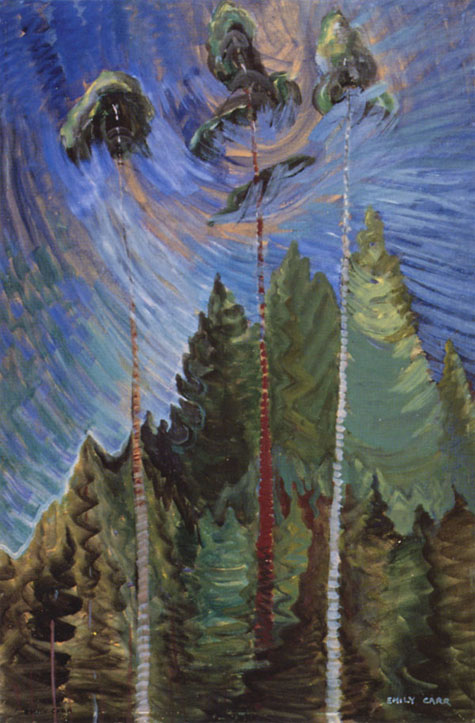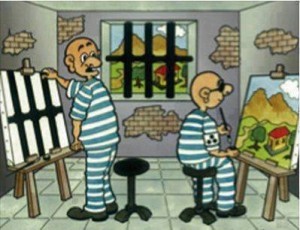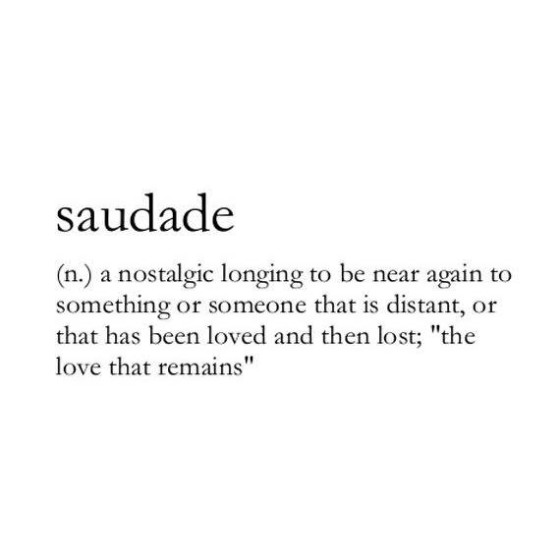Writings: What do you hear?

Some days, do you get the feeling you’re missing something?
This is a story a friend of mine told me:
I was walking down the sidewalk on a busy New York City day with a friend who lives in the forests of Brazil. He stopped, cocked his head & said, “Listen! I think that’s a robin.” And sure enough, we looked up and there was a bird on the sign above us. I said, “Wow, how could you hear that, with all the city noise here?”
My friend said, “You hear what you are trained to hear,” and took a handful of change from his pocket and scattered it on the concrete at our feet. Immediately, people turned and stared, and bent over and started picking it up; the sound was not even as loud as the bird’s song in the city din.
“See?” he said. “You hear what you hear.” He smiled.
Seems to me there are plenty of songs going on around me, that I miss because I listen for coins, not bird songs. Sometimes the song is a smile from a friend that I miss because I’m too worried about something.
Sometimes it’s something blooming on the bush when I’m walking & thinking deep thoughts about things that aren’t blooming; often I miss a song from today because I’m focused on something that happened in the past.
The guy in the story above says, “You hear what you are trained to hear,” and I think it’s possible for us to re-train ourselves.
This week I’ve looked for & found a new song each day – something I hadn’t noticed that is right around me, but that I couldn’t hear or see or taste or smell or feel because of the head-din in the city of my mind. I stop, I breathe, I listen, and there are new things all around.
And it makes each day new.
Try it & let me know how it goes for you.
Loving what you do –
Brother Ian
Writings: Rainbow in the clouds, with Maya Angelou…be a blessing to somebody

Upon learning of Dr. Maya Angelou’s passing on May 28, Oprah Winfrey released a statement that referred to the poet, author and legend as “the rainbow in my clouds.” The touching sentiment is one that Dr. Angelou herself had discussed during her 2011 appearance on “Oprah’s Master Class.”
During that interview, Dr. Angelou explained where she first heard the “rainbow in the clouds” metaphor, which comes from a 19th-century African-American song popularly known as “God Put A Rainbow in the Clouds.” In the above video from the episode, Dr. Angelou sang the powerful lyric that resonated so strongly with her.
When it looks like the sun wasn’t going to shine anymore, God put a rainbow in the clouds.
“Imagine!” Dr. Angelou marveled. “I’ve had so many rainbows in my clouds. I had a lot of clouds, but I had so many rainbows.”
Dr. Angelou said she always carried these “rainbows” with her to her speaking and teaching engagements, whether in a large venue or intimate classroom. “I bring everyone who has ever been kind to me with me,” she said. “Black, white, Asian, Spanish-speaking, Native American, gay, straight, everybody. I said, ‘Come on with me. I’m going on the stage. Come with me. I need you now.'”
Whether her “rainbows” were living or had long since passed, Dr. Angelou said she always felt and drew strength from their support. “I don’t ever feel I have no help,” she said. “I had rainbows in my clouds.”
She also encouraged people to apply the “rainbow in the clouds” philosophy to their own lives.
“The thing to do, it seems to me, is to prepare yourself so you can be a rainbow in somebody else’s cloud. Somebody who may not look like you. May not call God the same name you call God — if they call God at all,” she chuckled. “I may not dance your dances or speak your language. But be a blessing to somebody. That’s what I think.”
from The Huffington Post
Writings: The Three Sieves Test
 It is my greatest dream that no news story get published until it’s passed this test, in this anecdotal fable attributed to Socrates:
It is my greatest dream that no news story get published until it’s passed this test, in this anecdotal fable attributed to Socrates:
Once upon a time in ancient Greece, one of the acquaintances of the great philosopher Socrates came up to him and said: “Socrates, do you know what I just heard about one of your students?”
“Hold on a moment,” Socrates replied. “Before you tell me, I would like to perform a simple test. It is called the ‘Three Sieves Test.’ ”
“The ‘Three Sieves Test?’ ”
“Yes. Before you say a word about my student, take a moment to reflect carefully on what you wish to say by pouring your words through three special sieves.”
“The first sieve is the Sieve of Truth. Are you absolutely sure, without any doubt, that what you are about to tell me is true?”
“Well, no, I’m not. Actually, I heard it recently and…”
“All right,” interrupted Socrates. “So you don’t really know whether it is true or not. Then let us try the second sieve: the Sieve of Goodness. Are you going to tell me something good about my student?”
“Well…no,” said his acquaintance. “On the contrary…”
“So you want to tell me something bad about him,” questioned Socrates, “even though you are not certain if it is true or not?”
“Err…”
“You may still pass the test though,” said the Socrates, “because there is a third sieve: the Sieve of Usefulness. Is what you want to tell me about my student going to be useful to me?”
“No. Not so much.” said the man resignedly.
Finishing the lesson, Socrates said: “Well, then, if what you want to tell me is neither true nor good nor useful, why bother telling me at all?”
Whale News: Talking to them, talking to us

For this story, you need to click here to both read it & more importantly, hear it, and to hear Noc the Beluga whale’s speech….wow!
Writings: Put down the notes….he didn’t say, “I have a speech,” he said, “I have a dream!”

Lots of folks have lots of different angles about this week’s 50th anniversary celebration of Dr. King’s “I Have A Dream” speech, but one of the perspectives is provided as a reminder that sometimes we need to
* get off script
• challenge our inner wiring, and
• say what’s in our heart & mind, before we talk ourselves (or think ourselves) out of it.
Sojourners’ Jim Wallis was fourteen in 1963, but he heard this story:
I have been personally moved by the reminders of that providential moment in the final speech at the March, when King’s favorite Gospel singer, Mahalia Jackson, told the preacher from the steps of the Lincoln Memorial, “Martin, tell them about the dream!”
King set aside his prepared remarks and did just that, reminding us all to put down our prepared notes and cautious plans and speak from the depths of our own souls and the soul of our faith to the soul of our nations.
Poetry in music: “Love Someone,” with Jason Mraz & Raining Jane

Love Someone, by Jason Mraz
Love is a funny thing
Whenever I give it – it comes back to me
And it’s wonderful to be giving with my whole heart
As my heart receives your love
Oh, ain’t it nice this life we got each other
I am right beside you
More than just a partner or a lover,
I’m your friend
When you love someone
Your heartbeat beats so loud
When you love someone
Your feet can’t feel the ground
Shining stars all seem to congregate around your face
When you love someone
It comes back to you
And love is a funny thing
It’s making my blood flow with energy
And it’s like an awakened dream
Oh what I’ve been wishing for is happening
And it’s right on time
Oh ain’t it nice tonight we got each other
I am right beside you
More than just a partner or a lover
I’m your friend
When you love someone
Your heartbeat beats so loud
When you love someone
Your feet can’t feel the ground
Shining stars all seem to congregate around your face
When you love someone
When you love someone
I gonna give myself to love tonight
I’ll lift you up to touch the moonlight
And we will savor every second we
Spend together you and I will
We’re gonna give ourselves to love tonight
Lifting up to touch the starlight
And we will savor every second we
Suspend together you and I will
You and I will, you and I will
When you love someone
Your heartbeat beats so loud
When you love someone
Your feet can’t feel the ground
Shining stars all seem to congregate
Around your face when you love someone
When you love someone
It comes back to you
Everyone needs a hand…

Writings: Filling the picture, with Emily Carr

This is a little bit from Canadian artist Emily Carr, one of my favourite folk:
“Remember, the picture is to be one concerted movement in a definite direction for a definite purpose, the expression of a definite thought. All its building is for that thought, the bringing into expression and the clothing of it.
“Therefore if you have no thought that picture is going to be an empty void, or worse still, a confusion of cross purposes without a goal. So old girl, be still and let your soul herself find the thought and work upon it. She alone understands and can communicate with her sister out in nature.
“Let her do the work and, restless workers, running hither and thither with your smelling, looking, feeling, tasting, hearing, sit still till your Queen directs but do not fall asleep while you wait – watch.”
Emily Carr

Starpeople: How big is…big?

Pluto’s smaller than Earth’s moon (one of the discoveries this week), and there’s a detailed account of that in this report (the geek in you will love this….):
http://astronomynow.com/2015/07/13/how-big-is-pluto-new-horizons-settles-decades-long-debate/
On the other end of the discussion – how big are known objects in the universe? Here’s an easy-to-understand little vid that will make you say wow:
Writings: Read this one out loud … …. The Waking

The Waking
by Thoedore Roethke
I wake to sleep, and take my waking slow.
I feel my fate in what I cannot fear.
I learn by going where I have to go.
We think by feeling. What is there to know?
I hear my being dance from ear to ear.
I wake to sleep, and take my waking slow.
Of those so close beside me, which are you?
God bless the Ground! I shall walk softly there,
And learn by going where I have to go.
Light takes the Tree; but who can tell us how?
The lowly worm climbs up a winding stair;
I wake to sleep, and take my waking slow.
Great Nature has another thing to do
To you and me; so take the lively air,
And, lovely, learn by going where to go.
This shaking keeps me steady. I should know.
What falls away is always. And is near.
I wake to sleep, and take my waking slow.
I learn by going where I have to go.
Theodore Roethke, “The Waking”
from Collected Poems of Theodore Roethke.
Copyright 1953 by Theodore Roethke.








 Over the centuries, Brother Ian has been collecting stories & information & discourses for the purpose of elevating the human condition as needed, dissecting it when necessary, and building the case for hope.
Over the centuries, Brother Ian has been collecting stories & information & discourses for the purpose of elevating the human condition as needed, dissecting it when necessary, and building the case for hope.